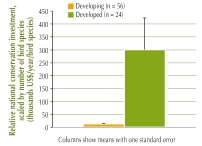
Relative annual conservation investment (scaled by the number of bird species in the country) is over 20 times lower in developing countries, which hold the bulk of global biodiversity, than in developed countries.

There are three main problems affecting resources for conservation world-wide. Not enough money is being spent, finance is not sustained, and it is often applied in the wrong way and in the wrong places.
Biodiversity is concentrated in the tropics but economic wealth is not. To conserve globally important biodiversity, many international conservation NGOs invest in tropical countries, as does the Global Environment Facility (GEF), the funding mechanism for the Convention on Biological Diversity. How far do these sources make up any shortfall from cash-strapped developing-country governments? The figure shows a relative measure of national investment in conservation, adding up: (a) estimates of the national protected areas budget (James et al. 1999, A. Balmford in litt. (2003); (b) average annual GEF ’biodiversity’ investment since 1990; and (c) country-specific investments by the eight largest international conservation NGOs in the year 2002 (unpublished data provided by BirdLife International, Conservation International, Fauna & Flora International, IUCN, The Nature Conservancy, Wildlife Conservation Society, World Resources Institute and World Wildlife Fund; all adjusted to 1996 US$).
Despite the efforts of the GEF and the NGOs, average national conservation investment (scaled by the number of bird species in the country, a simple index of biodiversity) is over 20 times lower in developing countries (as defined by the FAO 2001) than in developed nations. This inequality is even more acute when scaled by the number of globally threatened bird species (analysis of data held in BirdLife’s World Bird Database 2004), with almost US$15.5 million scaled investment each year in developed countries, compared to c.US$0.5 million in developing countries. Correcting this global imbalance requires much greater investment in tropical conservation by developed countries, which benefit from the global goods and services that tropical biodiversity provides.
Links
References
Compiled: 2004 Copyright: 2004
Recommended Citation:
BirdLife International (2004)
More needs to be invested in biodiversity conservation, especially in developing countries.
Downloaded from https://datazone.birdlife.org/sowb/casestudy/more-needs-to-be-invested-in-biodiversity-conservation-especially-in-developing-countries on 23/12/2024